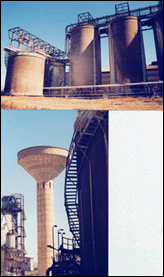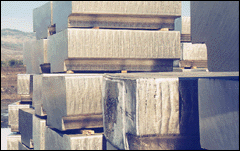 REBUILDING THE ECONOMY REBUILDING THE ECONOMY |
Much of the Montenegrin economy still relies on heavy industry and the sale of commodities. So now that the country has recovered from the hangover of sanctions and regional isolation, it has to rebuild and reach out.
The current administration is therefore implementing a restructuring program through the modernization of local companies to encourage added-value production.
"We have some companies which were very good in the last three or four years in finding new markets, selling their goods abroad and produce competitive products either in Montenegro or in former Yugoslavia or abroad" says Darko Uskokovic, Minister of Economy. Yet Uskokovic admits that a majority of companies are struggling to expand and develop. "For this, we need new know-how and foreign investments".
Uskokovic is part of the new generation of government officials that embraces competition, capitalism and smaller government. "We think that the role of the state will be to provide the rules of the game" he says, accepting the need for major restructuring of state-owned companies.
"Our mission is to try to bring back some companies on solid foundations, to restructure and modernize them".
The new government took this job seriously starting by re-establishing contacts and cooperation with the neighbouring countries and opening a restructuring program through privatisation models and through stimulation of production within the companies. The main problem in most cases is that companies were not producing competitive goods.
"We have some companies which were very good in the last three to four years in finding new markets, selling their goods abroad and producing competitive products either in Montenegro or in former Yugoslavia or abroad. Beside those companies, we have quite a big number of companies, which have not managed to expand. Therefore, we are trying to visit them, to solve the problems they have and try to promote programs that will make their products more competitive. For this, we need new know-how and foreign investments", says Uskokovic.
Nevertheless, adds the Economy Minister, there are numerous companies and projects that are very profitable, and the newly adopted Law on Foreign Investments, Privatization Law and Central Bank Law are good bases to foster confidence among foreign investments. "We think that the role of the state will be to provide the rules of the game" continued Mr. Uskokovic.
"Our mission is to try to bring back some companies on solid foundations, to restructure them and modernize them, as they are companies which have a future. Some of the companies need, for example, just DM 100,000 or DM 200,000 of foreign investments to buy new tools for cost effective production. Few of them already have contracts with partners abroad", continued Uskokovic.
An important role of the Ministry and the Government lies in development of SMEs (Small and Medium-sized Enterprises). Government already established an Agency for SMEs that has taken an essential role in restructuring the economy. Since there are more employees within the companies than needed, the future lies in training and supporting these people who will leave their jobs to establish their own companies through SME programs.
The strategic orientation of Montenegro is its diversification, through the development of agriculture, tourism and all service industries.
One of the promising industries is the food processing one. "We have plenty of companies in Montenegro which can work and export final products at competitive prices" says Uskokovic.
There is also a high potential in the metal processing industry (aluminum, steel and minerals). Another industry with a good chance for development is textile.
"We are eager to attract as many foreign investors as possible" adds Uskokovic. "For most of the companies we are aware that we have a surplus of employees, but with the help of the state we will apply the social program for redundant workers".
The priority is to gradually gain foreign investors' confidence, and at the same time stimulating the confidence of domestic entrepreneurs by adopting the new Company Law and the Labor Law.
 Modernizing KAP: the aluminum giant Modernizing KAP: the aluminum giant |
The main exporting industry in Montenegro is aluminium, and one of the biggest successes of the restructuring program is KAP (the national aluminium corporation). It is the biggest company in Montenegro that suffered from major losses during the sanctions.
"During the sanctions KAP production went down to 10 000 tones. The raw material was transported from Albania, Croatia, Macedonia and Bosnia. The price of one ton of aluminum, at that time was close to 4000 USD, an amazing sum of money. Also the bad management of KAP did not help us, we had debts for about 200 million-DM", recalls Mihailo Banjevic, General Manager of KAP.
| 
KAP is the leading corporation in Montenegro - bringing in a turnover that represents over 50% of GDP and almost 90% of existing Montenegrin exports. The whole economic chain in Montenegro depends on it, from the Bauxite Coal Mine, the Electricity system, the Railways of Montenegro, right up to the Port of Bar.
"They say that when the aluminium combine coughs, the whole of Montenegro catches cold" says Banjevic to illustrate the importance of his company.
Thankfully, business has steadily improved for the aluminium giant. A new management contract with Swiss Glencor in 1998 resulted in a new program that restored the profitability of KAP, and during the past three years the company has increased production to 107,000 tones of commercial aluminium yearly, income for 2001 grew to $170 million and exports rose to 92% of production.

Even with the decrease of world prices of aluminium, KAP still managed to pull in $24 million in profits last year.
"We are now working on maintaining the stability of the project and the lowering of our expenses" says Banjevic. "We are not satisfied with the price we have now and unfortunately we will have to reduce the number of employees… We consider this year to be the year of reconstruction and stability".
 Vektra: A private sector success story Vektra: A private sector success story |
One of KAP 's main partners on the domestic market is "Vektra", another successful company in Montenegro. Established in 1990 as one of the first private companies in this country, Vektra worked with KAP during sanctions in order to develop an international trade network for the sale of the country's aluminum.
Vektra started as a representative of Peugeot in Montenegro, and its fruitful cooperation with KAP allowed it to branch out into various fields of business.
"In 1995, it was time to bring in something new" recalls Dragan Brkovic, General Manager of Vektra. "We started a new kind of business in the development of the company in construction", and proceeded to build the most prestigious business and residential center in Podgorica.
Brkovic vertically expanded his company by purchasing two transportation companies - they expanded Vektra's business operations by ensuring better service for its clients and better control over its operations. The transport companies were about to go bankrupt and very soon Vektra managed to make them profitable.
Today, Vektra is one of the most profitable companies in Montenegro, with strong business network in Switzerland, Italy and the US. It illustrates the potential for international success in such a seemingly small country.
"We have always hoped to have a more stable country to start economic reforms in privatization" says Brkovic. "We have been waiting for it for the past 12 years. Finally, we achieved it". |

